Good morning, Creeps!
Welcome to another episode of Twenty Questions with Susan! Today’s victim: Seventh Star Press’ own John F. Allen. I’m particularly excited about this one because not only are we showcasing a fantastic book, but also a fantastic author and someone who has quickly become a great friend. I have a blast with this guy, and I’m sure all of you will too.
So, enough of my mouth…let’s see what John has to say, huh?
20 QUESTIONS WITH JOHN F. ALLEN
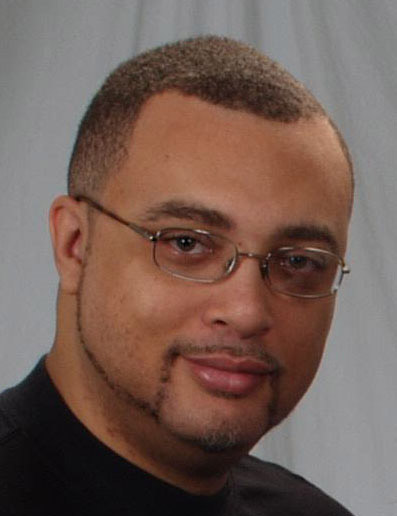
SHR: So, John, tell us a bit about yourself:
JFA: I’m an American writer, who focuses primarily on speculative fiction, but I also write poetry, essays, literary fiction stories and I am also a business writer. I studied Liberal Arts at IUPUI with a focus on Creative Writing, received an honorable discharge from the United States Air Force. I was born and raised in Indianapolis, IN where I currently reside with my wife and two children. My debut novel, The God Killers is published through Seventh Star Press.
SHR: And how long have you been writing?
JFA: I’ve been writing since second grade. I started reading comic books in kindergarten, graduated to action adventure tales and mysteries and then began to make up my own stories about the characters I read about. It wasn’t very long before I started making up characters and stories of my own and the rest is history.
SHR: What is a typical day in your life like?
JFA: Throughout the week I take my son to school, come home eat breakfast and brew some coffee, and then I dive into writing! My goal is anywhere from 500 to 1000 words a day and most of the time I hit right around there. In the evenings, I work at a bookstore. Sunday is family day and I usually don’t write on that day.
SHR: Let’s talk books. When choosing reading material, what factors are important to you?
JFA: Genre, story and characters are very important factors I consider. I usually reach for speculative fiction works, but sometimes I read literary fiction, biographies, and other real life tomes. Of course I’m reading a lot of those types of books for research purposes, but I do enjoy them on their own merit occasionally.
SHR: And about your book now… tell us about this book and how we can get it:
JFA: The God Killers is available in paperback and as an ebook from Amazon/Kindle, Barnes & Noble/Nook, ibookstore, ebookpie and kobo.
Here is a link: http://johnfallenwriter.com/the-god-killers/
SHR: On Writing: How many genres do you write in? Which is your favorite?
JFA: I write in fantasy, urban fantasy, science fiction, horror and mystery. My primary genre is urban fantasy as it can encompass practically any of the other genres to some extent. I’d have to say that it is my favorite for this reason.
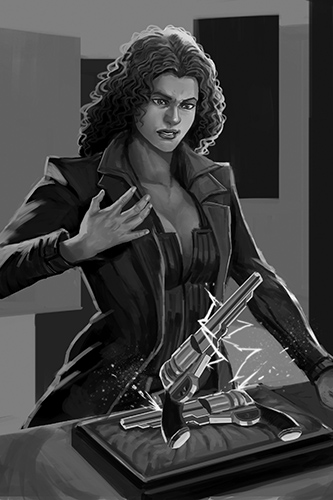 SHR: Question about the craft: Which type of horror holds more appeal for you and why: situational or psychological?
SHR: Question about the craft: Which type of horror holds more appeal for you and why: situational or psychological?
JFA: I’d have to say that from a reading standpoint, psychological. I think that I want to be threatened right along with the protagonist in such a way that I’m a bit paranoid after reading the work. From a writing standpoint, I’d say situational. In placing my characters in a situation and letting the horror unfold, I allow for the characters to lead the way in their fate as I write.
SHR: Do you prefer to scare your audience with a subtle build of terror or a big monster-behind-the-door reveal?
JFA: I actually prefer to use a subtle build of terror, then end up with the BIG monster-behind-the-door being revealed as the threat and shattering the psyche of my protagonist in the process. I’m just sort of churlish that way.
SHR: Are the blood and guts necessary? Why or why not?
JFA: I think that it depends upon the story. I would not like to read or write a monster story/novel where there are no blood and guts involved. Then on the flip side, I don’t want to read or write a story/novel where the blood and guts are thrown in for absolutely no other reason than to gross me out. The blood and guts should serve some greater purpose than just shock value and gratuitous gore. However, that’s merely my personal opinion.
SHR: With the paranormal being all the rage these days, do you feel non-human characters are required for a good story?
JFA: No, but they are expected in certain circumstances and in those circumstances when they are omitted, the story most often falls flat. For example, an urban fantasy tale with some sort of fantasy creature, no matter how humanlike, is something that is expected. But, when they are lacking, it’s sort of a let down, at least to me. When I read science fiction I want aliens, robots/androids or intergalactic war.
SHR: Back to your writing: Your inspiration – is it from your imagination or from personal experience?
JFA: Both actually. I believe that imagination is heavily influenced by personal experience. When a creator imagines something it is bound to take into consideration either what they have experienced or imagine experiencing based upon what they haven’t. I personally, tend to be inspired by the, “What if?” question. I usually am spurred to imagine a scenario by asking myself that question and it’s often tempered/influenced—in at least some way—to my own personal experiences.
SHR: If given the opportunity to meet one of your characters in real life, which would it be and why?
JFA: It would definitely be Ivory Blaque. I think that she’s a dynamic character and one I’m particularly fond of. She is dearest to my heart for various reasons and I find her to be particularly interesting due to her worldly acumen and struggles with faith and understanding of the world she lives in. I suppose we have a lot in common.
SHR: Plotter of Pantser? Is there an advantage to either?
JFA: I’m a pantser. I think that the advantage of being a pantser is the spontaneity of the process. For me, plotting is too rigid and doesn’t allow for the truest development of the character. I’ve tried plotting and the closest thing I do to that is I jot down about 1-3 paragraphs to get my idea some tangibility, then I start writing. I rarely refer to the paragraph(s) ever again.
SHR: How do you go about researching your stories?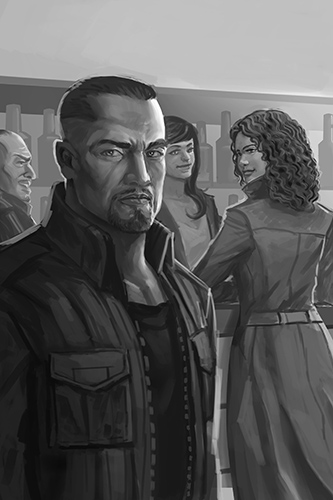
JFA: I think of the people, places or things that I am either unfamiliar with or have limited knowledge of and make a list. I generally take at least 3-5 pages of notes on any given subject and often times only utilized about 1-3 sentences of fact. This is basically to lend authenticity to what I’m writing about within the realm of possibilities. Sometimes, I do delve quite a bit further into my research for say a historical figure that happens to be a character or an actual place where a generalized approach would be disingenuous. Sometimes setting (place) is an integral part of the story or affects the everyday life and/or thoughts of the character and serious consideration is needed. For example, a person living in Chicago (Ivory Blaque) would have some sense of history as far as the city is concerned and holds that in regard. If I as author I don’t take that into consideration when I write of her responses, thoughts and actions, I’m being disingenuous to the character and the city and its citizens. That’s no way to endear readers I think.
SHR: What comes first, the plot, the characters, or the setting?
JFA: For me it can depend upon the answer to my “What if?” question. If the answer is focused on a general idea (plot), then that comes first. If the answer solidifies into an actual character, then the character comes first and the same if the answer focuses on setting. When I’m creating, just because one of the above comes to fruition in my mind, it doesn’t mean that it will take precedence in the story once the creative juices begin to flow.
SHR: Who is in control when you write, you or your characters?
JFA: I’d say that for me it’s a give and take situation. Most times I’m only in control up to a point before the baton is passed to the character and they start to dictate to me. I feel that this give and take relationship is something mutually beneficial for me as a writer and for my readers.
SHR: When you write, is it with or without visual/audio stimulation (tv, music, etc.)?
JFA: I always write listening to music. Sometimes depending upon the scene, I may play a specific genre of music, but mostly it’s a blend of old school R&B, Rock, Disco, Hip Hop, Jazz & Blues. I almost NEVER watch TV while writing as I find that to be too great of a distraction and it interrupts my creative flow.
SHR: If you were told you could never write again, what would you do to fill your time?
JFA: I would draw and paint. I’m also a visual artist as well as a writer. I think of it as a double edged gift, both a blessing and a curse. I would be able to write with pictures, which is a cheat in a way. I find that it’s the strong visual images in my visual artist mind that lends to me being as descriptive as I tend to be in my writing. It is great for that purpose, but sometimes gets in the way of giving much flexibility to my readers to interpret things as they want in their own mind’s eye. Although ironically, the majority of my readers thus far have said they enjoy my descriptiveness.
SHR: Literary Hot Button: What are your thoughts on Writer’s Block? Does it exist? How do you overcome it?
JFA: Writer’s block is a real phenomenon. I don’t believe it to be an act of laziness or sloth—even though some folks genuinely use Writer’s Block as a crutch for such behavior/inactivity. I have personally experienced it and can only speak for myself in regards to it. I usually find myself writing my way out of it. I just type anything that pops into my mind and keep on in that vain and I usually end up back in the saddle as it were. This simple solution works for me, but might not work for everyone. I think that we all must find our own way to deal with Writer’s Block, but deal with it we must!
SHR: As an author, what’s next for you?
JFA: I am currently promoting my debut novel The God Killers, an urban fantasy and Thunder on the Battlefield, a Sword and Sorcery anthology which features my short story, Forest of Shadows. I’m also working on the second book in the Ivory Blaque series titled, The Conclave as well as a plethora of short stories and novellas in various genres.
Remember The Best Is Yet To Come (TBIYTC)!!!
How to find John:
Website | FB Author Page | FB Fan Club Page | Twitter
ABOUT THE GOD KILLERS
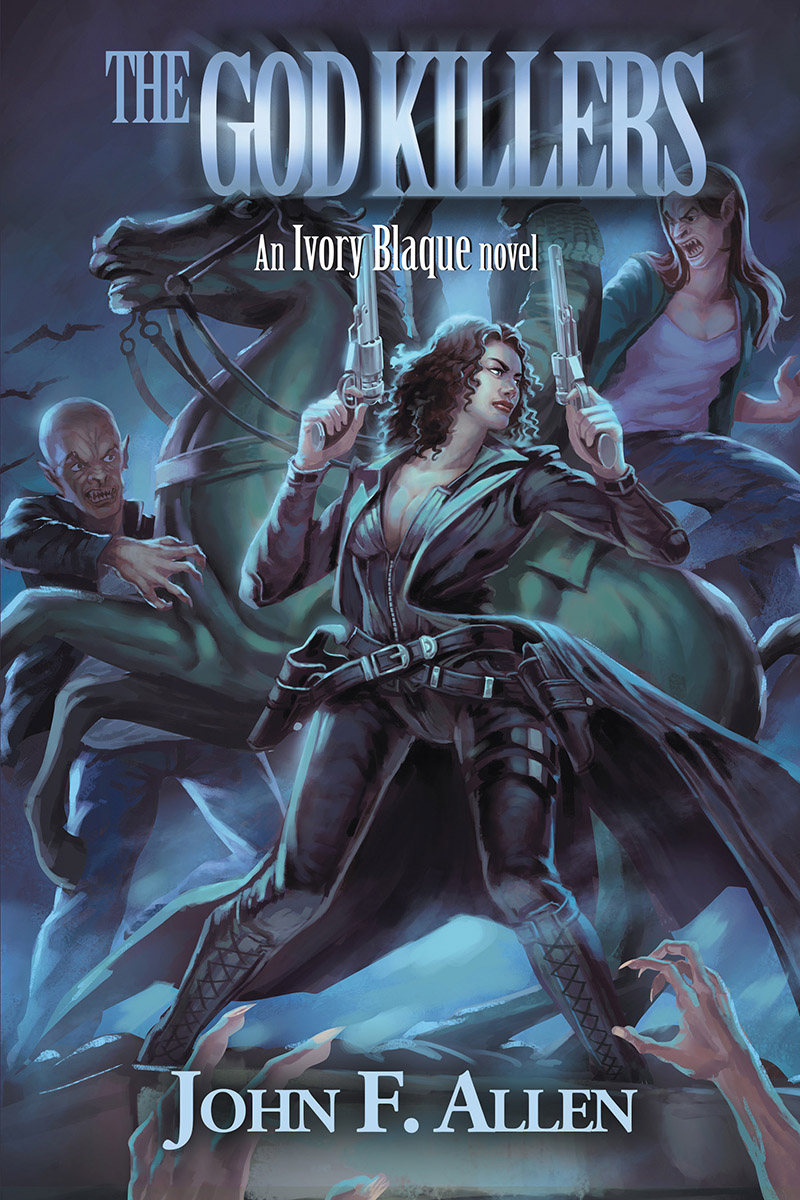
In The God Killers, the first book of The God Killers Legacy, former professional art thief Ivory Blaque is hired to procure a pair of antique pistols and gets much more than she bargained for when several attempts are made on her life.
Her client turns out to be a shadowy government agent who reveals that she is descended from a race of immortals, and that the pistols are linked to her unique heritage and the special psychic gifts she possesses. He uses the memory of her father to guilt her into working for him.
Ivory eventually gives in to his request, and in return, he presents her with her father’s journal, which was written in an unbreakable code. Bishop believes that she is the only one capable of breaking the code and unlocking the plans of the vampire hierarchy. But when the city’s top vampire is a sexy incubus with an attraction for her and she’s assigned a hot new lycan enforcer to protect her, she finds herself caught between two sets of rock hard abs.
To regain her autonomy, clear her name, unlock the secrets of her past, and protect the lives of those closest to her, Ivory must play along with the forces trying to manipulate her. Ivory’s life is rapidly spiraling out of control and headed for an explosive conclusion which she just might not survive.
Buy it Here:
Print | Kindle | Nook | Kobo | iBookstore
Be sure to check out John on the rest of his tour!
Click here for more information.
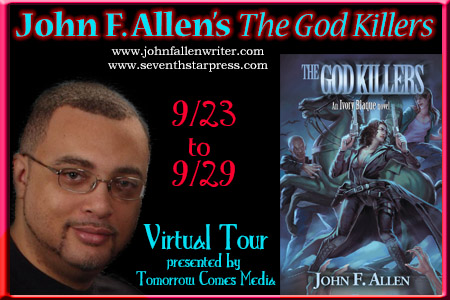
Great interview, Creepette. 🙂 And here’s well wishes to John and YOU on your literary endeavors.
Thank you very much! We’re all on this roller coaster together, including you, so let’s just hold on tight and see where it takes us. 🙂